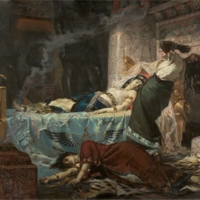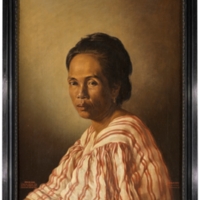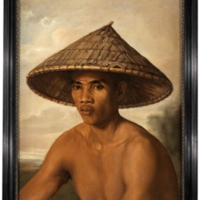El arraigo de las costumbres
Text
Translated as The Rootedness of Customs or the Rooting of Customs, this is a wooden sculpture of a man carrying a small open coffin with the lifeless body of a young child.
Share this
Media
Images
Map The Prado Museum
Metadata
Creator
Ciriaco Gaudínez and Javier (Philippine Islands, 1848 - 1919/20)
Date
Around 1887
Rights
© Museo del Prado, used with permission
Identifier
E000968
Materials
Carving
Physical Dimensions
Height: 82 cm .; Width: 29 cm .; Depth: 41 cm.
Provenance
Overseas Museum, 1887-1908; Museum of Modern Art, 1908-1971.
Display status
(On loan) to National Museum of Anthropology - Madrid - Madrid - Spain
References
García Llansó, Antonio, El Museo Biblioteca de Ultramar, Tipolitografía de Luis Tasso, Barcelona, 1897, pp. 80. Discovering Philippine art in Spain, Dept. of Foreign Affairs and National Centennia..., Manila, 1998. Díaz Pascual, Concha, Escultores Filipinos 1850 - 1898 (A -J), Cuaderno de Sofonisba,
Informative blog on Philippine Sculpture in the Prado
Sánchez Gómez, Luis Ángel, “Indigenous Art in the Philippine Exposition of 1887: Arguments for an ideological and racial battle in a colonial context”, in Journal of the History of Collections 14, no. 2 (2002), pp. 283 – 294.
Informative blog on Philippine Sculpture in the Prado
Sánchez Gómez, Luis Ángel, “Indigenous Art in the Philippine Exposition of 1887: Arguments for an ideological and racial battle in a colonial context”, in Journal of the History of Collections 14, no. 2 (2002), pp. 283 – 294.
Official Website
Collection
Source
Translated by Google Translate
Record accessed in March 2021
Edited for grammar by the Mapping team
Record accessed in March 2021
Edited for grammar by the Mapping team
Cite this Page
Ciriaco Gaudínez and Javier (Philippine Islands, 1848 - 1919/20), “El arraigo de las costumbres,” Mapping Philippine Material Culture, accessed April 26, 2024, https://philippinestudies.uk/mapping/items/show/6034.
Related Exhibits
Geolocation
Sensitive Content
Mapping Philippine Material Culture collates digital material from institutions, and some of this material is inherently colonial and contains words, terms and phrases that are inaccurate, derogatory and harmful towards Filipino and Filipino diasporic communities. Catalogue transcriptions, book titles, exhibition titles and museum titles may contain harmful terms. We recognise the potential for the material to cause physical and mental distress as well as evoke strong emotions. Owing to the scale of the collection’s data, a process to implement sensitive-content warnings in the displayed data is still incomplete. The material within the catalogue does not represent Mapping Philippine Material Culture’s views. Mapping Philippine Material Culture maintains a strong anti-colonial, anti-racist position and affirms its support for centring the humanity of historically marginalised and disenfranchised communities.
Facebook Twitter


